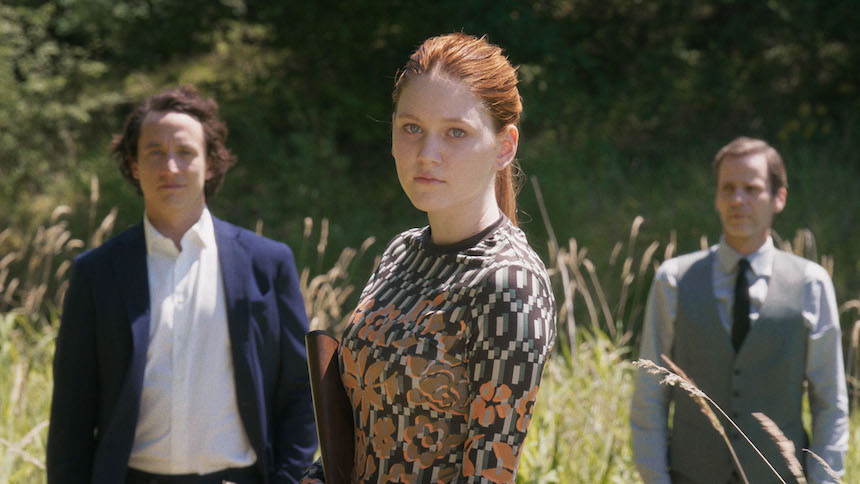Sundance 2024 Review: VENI VIDI VICI, Eat the Rich Before They Eat Us

Roughly translated from Latin, “Veni Vidi Vici,” means “I came, I saw, I conquered.”
Usually attributed to Julius Caesar, the phrase reflects the casual brutality, cruelty, and avarice of the onetime Roman Republic and its successor, the Roman Empire. It also implies that non-Romans existed solely to be conquered, their individual and collective fates determined not by their allegiance to Rome and its emperors, but by their conquerors' arbitrary and capricious whims. To live under Roman rule as a subject and not a citizen was to live — and often die — in abject fear of a premature demise.
That sense of power, privilege, and entitlement, of ownership over the bodies, hearts, and minds of the non-ruling classes permeates Austrian filmmakers Daniel Hoesl and Julia Niemann’s cynical, borderline nihilistic satire of contemporary Europe, Veni Vidi Vici. Using an Austrian family, the Maynards, as stand-ins for the current debilitating state of Austria and by extension, Western Europe and even the United States, Veni Vidi Vici indulges in a blackly comic view of the modern world, but its satire, however relevant or on-point it might be, never goes beyond surface shocks or one-note humor.
Amon Maynard (Laurence Rupp) is a fitness-obsessed sociopath with several billion Euros to his name and key politicians in his back pocket, an expansive mansion outside the city, and a comfortably placid home life with his wife, Viktoria (Ursina Lardi), and three daughters ranging in ages between 8 and 13. Two of their daughters are adopted and non-Caucasian, meant, at least in part, to signal progressive values, while the oldest daughter, Paula (Olivia Goschler), from a previous marriage, unquestioningly follows her father’s lead in all things personal (i.e., ethically, morally, and even legally). It’s Paula's narration, blissfully lacking self-awareness or even a hint of empathy, along with deliberately echoing her father's actions, that drive Veni Vidi Vici, hurtling towards a bleakly foregone conclusion.
The first moments turn on a bike rider on a winding road, a sudden gunshot followed by a second, fatal one, and serve as a microcosm for everything that follows: A man in biking clothes emerges from a location off-screen, takes a selfie with his butler/accomplice-in-crime, Alfred (Markus Schleinzer), and gleefully rides off on the dead man’s bicycle.
Hoesl and Niemann embrace a modern truism-turned-cliche: The ultra-wealthy aren’t like you or me (other ultra-wealthy members of their social, economic, and political class excepted). They live by completely different rules, avoiding arrest or conviction for all manner of criminal behavior, up to and including the cold-blooded murder that opens the film and the handful of similar murders sprinkled throughout Veni Vidi Vici’s sub-90-minute running time.
When questioned about his possible role in the serial murders, Maynard smugly claims he’d “never shoot an animal." His seemingly offhand comment hides an obvious implication in plain sight: His victims are worth less than the random animals that roam unencumbered around his palatial estate. He prefers a different kind of game, a game of the most dangerous kind, albeit from a distance with a sniper rifle where the intended victims have little chance of surviving, let alone escaping or fighting back. Sporting isn’t a word that applies to Maynard or his immediate family.
There’s never any doubt about Maynard’s guilt, only whether local law enforcement will do their due diligence and follow the clues to Maynard’s mansion or whether a down-on-his-luck reporter, Volker (Dominik Warta), will find a publisher for his heavily researched expose of Maynard and his crimes. Even then, there’s little doubt as to the outcome.
Everyone the Maynards encounter either becomes willing accomplices in their crimes, embraces willful ignorance/blindness as a means for survival, or, after a long, bitter struggle, switches allegiances from whatever outdated ideals they once held in exchange for the power and protection the Maynards and their billions offer.
It’s a deeply pessimistic, reactionary view both of human nature and the contemporary world, though it’s probably not far from the truth (serial murders aside). Hoesl and Niemann seem content, however, to allow the film’s central theme to play out over Veni Vidi Vici’s running time without a single variation. As a result, that makes Veni Vidi Vici feel like the thinnest of satires, offering superficial shocks, sledgehammer-subtle satire, and not much else besides A-level production values and a cast committed enough to give their level best to underwritten roles.
Veni Vidi Vici premiered at the 2024 Sundance Film Festival. Additional festival dates will follow in the immediate future.







